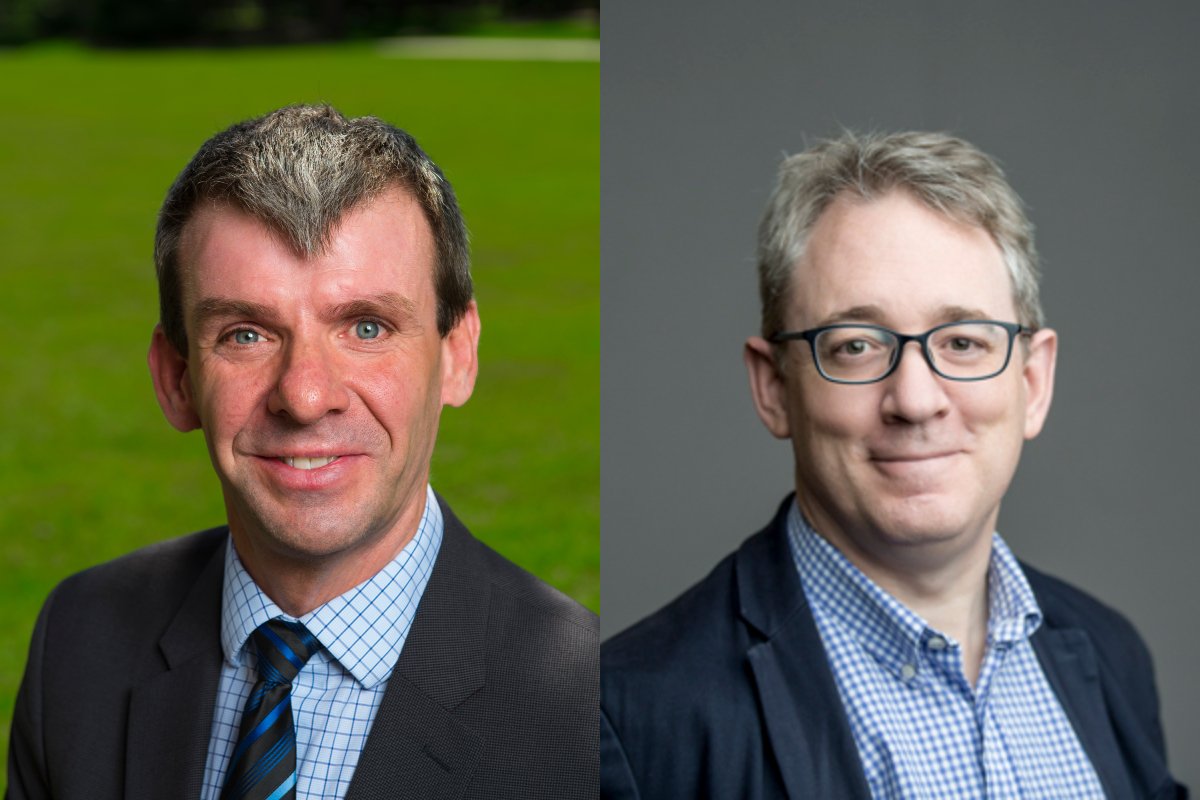
Professor Ian Mann in the Department of Physics (left) and Professor Todd Lowary in the Department of Chemistry (right) have both been inducted into the Royal Society of Canada, recognized for their research excellence and scientific accomplishments.
Ian Mann
Space weather research expert Ian Mann in the Department of Physics is one of two Faculty of Science researchers inducted into the Royal Society of Canada this year, joining the country’s oldest and most prestigious scholarly institute.
“I was delighted and honoured in equal measure to be recognized,” says Mann. “It is extremely humbling to think that I will be joining the ranks of many other recognized Canadian scientists as a member of the academy.”
Mann is chairman of the expert group on space weather of the United Nations Committee on Peaceful Uses of Outer Space. His research has delivered transformative understanding of extreme space radiation and geospace dynamics. He also helps promote the translation of research to policy, steering international efforts to mitigate the adverse technological impacts of extreme space weather.
“The sun is responsible for providing the energy for life on our planet,” Mann says. “However, the sun is also strongly coupled to the geospace environment—the region of outer space near Earth.” The impacts of this solar-terrestrial coupling in the form of space weather range from the generation of the beautiful dancing northern and southern lights to generating harsh radiation environments in space.
“At the University of Alberta we are actively developing training which will allow our students—and we hope ultimately the economy in the province of Alberta—to benefit from expansion and diversification into the ever-expanding commercial space sector,” says Mann. “It is truly an incredible honour to be selected as a fellow of the Royal Society of Canada and receive recognition for work in this important field.”
Todd Lowary
Professor Todd Lowary, in the Department of Chemistry, has also been inducted into the Royal Society of Canada, honouring his contributions to the synthesis of molecules to probe the biological role of carbohydrates.
Lowary and his team develop approaches to making molecules found in nature in the lab, then study how the molecules interact with biological systems. His pioneering contributions include novel methods for assembling some of the most complex carbohydrates ever synthesized. These molecules, access to which would be impossible without his work, have enabled understanding of the role of carbohydrates in diseases such as tuberculosis with applications in new drugs, vaccines and diagnostics.
“Our research has applications in helping better understand the role of carbohydrates in disease and infection, and enabling new diagnostic tools,” says Lowary, who is also scientific director of GlycoNet, a pan-Canadian Network of Centres of Excellence administratively based at the University of Alberta. GlycoNet identifies solutions to medical needs by exploiting the role of carbohydrates in biology.
One such project in which Lowary’s lab has been involved is the substantial improvement of a urine-based test able to detect tuberculosis. Tuberculosis kills millions around the world every year and is the leading cause of death for people living with HIV. Diagnostic tests like this are just one application of research to which Lowary’s team has contributed.
“The success we have had is due to two things,” says Lowary. “First, fantastic co-workers— most importantly talented graduate students, post-doctoral fellows and technicians. Second, is the exceptional research environment in the Department of Chemistry and Faculty of Science, which has been unwaveringly supportive of both my own program and the long tradition of excellence in glycoscience research at the University of Alberta.”